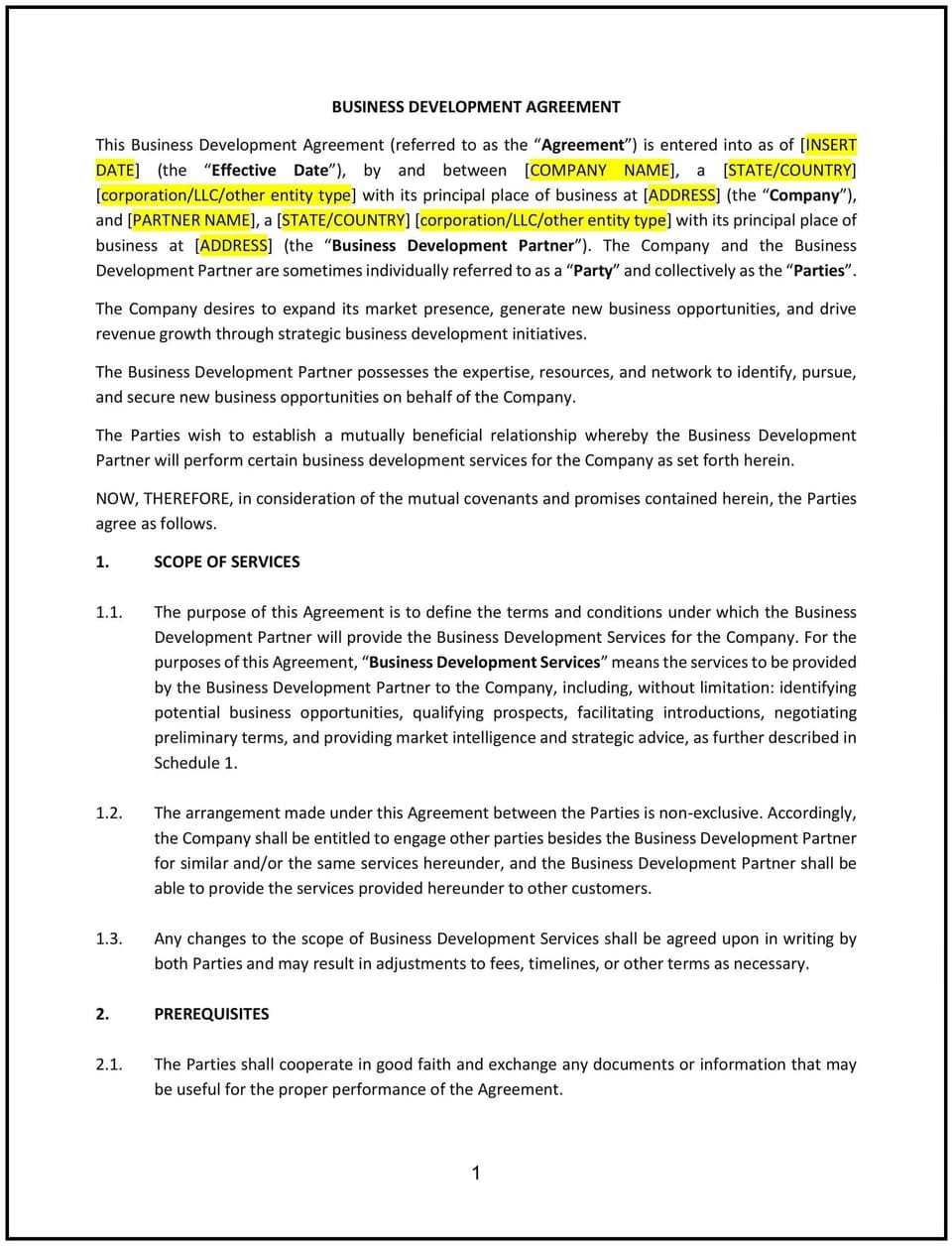Business Development Agreement (Kentucky): Free template

Business Development Agreement (Kentucky)
A Business Development Agreement is a formal contract that details how one party will support another in growing their business, boosting revenue, or accessing new markets. In Kentucky, these agreements are subject to state contract laws and must comply with consumer protection regulations, including the Kentucky Consumer Protection Act. Businesses must ensure their agreements clearly define deliverables, payment structures, and performance benchmarks.
For instance, a Louisville-based bourbon distillery might partner with a Lexington-based consultant to explore opportunities in the international spirits market. A carefully drafted Business Development Agreement ensures alignment on goals, timelines, and adherence to Kentucky’s legal standards.
Tips for drafting and maintaining a Business Development Agreement in Kentucky
- Define the scope of services: Clearly articulate the business development tasks to be performed, such as identifying leads, conducting market research, or securing partnerships. Include specific deliverables and timelines.
- Example: “The Provider will generate a minimum of ten qualified leads per month and secure at least two new partnerships within six months.”
- Establish payment terms: Detail the compensation structure, whether it’s a flat fee, commission-based, or performance-driven. Include invoicing procedures, payment deadlines, and penalties for late payments.
- Example: “The Client agrees to pay the Provider a monthly fee of $6,500, plus a 12% commission on all revenue generated from new clients introduced by the Provider.”
- Include performance metrics: Specify how success will be evaluated, using measurable KPIs like revenue growth, new client acquisitions, or partnership deals.
- Example: “The Provider will provide a quarterly report outlining progress on KPIs, including revenue growth and new client onboarding.”
- Address intellectual property rights: Determine ownership of any materials, strategies, or content created during the engagement. Typically, the Client owns the final output, while the Provider retains rights to pre-existing assets.
- Example: “Upon full payment, all intellectual property created under this agreement will transfer to the Client. The Provider retains rights to pre-existing materials.”
- Set confidentiality obligations: Protect confidential information shared during the engagement with a clause that aligns with Kentucky’s trade secret and privacy laws.
- Example: “Both parties agree to maintain the confidentiality of all proprietary information disclosed during the term of this agreement and for three years thereafter.”
- Outline termination provisions: Define the circumstances under which the agreement can be terminated, such as breach of terms, mutual agreement, or non-performance.
- Example: “Either party may terminate this agreement with 30 days’ written notice if the other party fails to meet the agreed-upon terms.”
- Align with Kentucky-specific laws: Ensure the agreement adheres to Kentucky’s contract laws and consumer protection regulations, including the Kentucky Consumer Protection Act.
- Example: “This agreement is governed by the laws of the Commonwealth of Kentucky. Both parties agree to comply with all applicable state and federal laws.”
Frequently asked questions (FAQs)
Q: Is a Business Development Agreement enforceable in Kentucky?
A: Yes, as long as the agreement is clear, mutually agreed upon, and compliant with Kentucky contract laws, it is legally enforceable.
Q: What key elements should a Business Development Agreement include in Kentucky?
A: It should address the scope of services, payment terms, performance metrics, intellectual property rights, confidentiality obligations, termination provisions, and compliance with Kentucky laws.
Q: Can a Business Development Agreement be terminated early in Kentucky?
A: Yes, if the agreement includes a termination clause, either party can terminate the agreement with reasonable notice. The terms should specify the conditions and process for termination.
Q: What industries frequently use Business Development Agreements in Kentucky?
A: Industries such as bourbon production, healthcare, manufacturing, agriculture, and tourism often use these agreements. For example, a Bowling Green-based automotive supplier might hire a consultant to expand its presence in the electric vehicle market.
Q: How can disputes over a Business Development Agreement be resolved in Kentucky?
A: Disputes can often be resolved through negotiation or mediation. If necessary, disputes may proceed to arbitration or litigation based on the terms outlined in the agreement.
This article contains general legal information and does not contain legal advice. Cobrief is not a law firm or a substitute for an attorney or law firm. The law is complex and changes often. For legal advice, please ask a lawyer.


